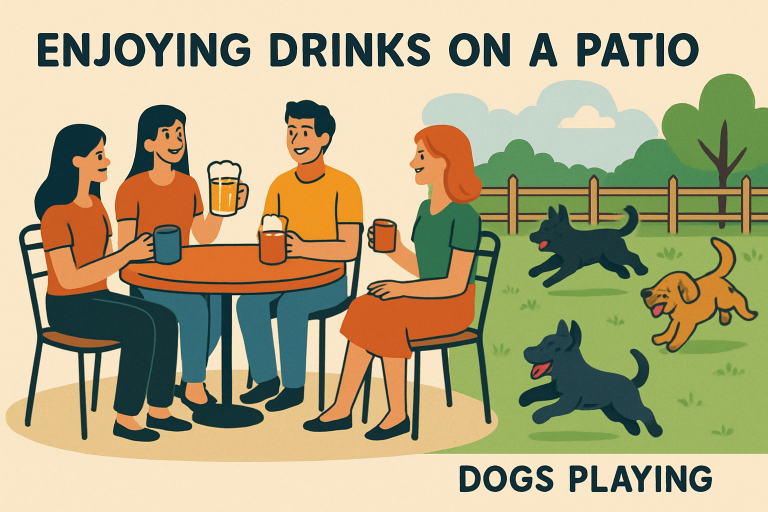Table of Contents
Introduction
Off-leash dog park bar franchises are rapidly transforming the way pet lovers and their canine companions connect and socialize. By mixing dynamic play zones for dogs with lively bar and lounge spaces for humans, these innovative venues are carving out a new niche that benefits communities and local economies. For those inspired to blend a love of dogs with entrepreneurship, exploring a dog franchise opportunity is one of the most promising trends in today’s growing pet market.
These hybrid establishments create vibrant gathering places where dogs roam free and play, while owners unwind with drinks and meet like-minded neighbors. The unique value of this business model lies in its ability to put both pet welfare and human enjoyment at the forefront, leading to a surge in popularity and the rapid emergence of new locations across the country.
The Rise of Dog Park Bars
The past decade has seen remarkable growth in spaces that merge dog-friendly amenities with social venues for people. What started as a few experimental locations, such as Skiptown in Denver or Dog Bar in Charlotte, is now inspiring a wave of new concepts. These venues typically feature expansive, secure off-leash parks—with agility gear, water features, and shaded lounge areas—alongside fully equipped bars serving craft brews and food. The approach fosters a unique environment where dogs can interact and expend energy, while their owners socialize in a relaxed, pet-centered setting.
This trend reflects shifting urban lifestyles. More city dwellers own pets than ever before, but they lack yards or public spaces where their dogs can run. Dog park bars satisfy this need for off-leash recreation while providing the social atmosphere and comforts that appeal to today’s millennial and Gen Z pet owners. As coverage from Axios reveals, these venues are quickly becoming staples in urban entertainment.

Benefits for Dogs and Owners
- Socialization: Dogs learn essential social skills and enjoy regular interaction, helping prevent behavioral issues and isolation.
- Exercise: With dedicated play areas often sized far beyond typical dog parks, dogs can safely run, jump, and burn off energy.
- Community Building: Humans meet other dog lovers, forging neighborhood friendships that strengthen local ties.
- Convenience: Owners enjoy trusted play spaces and enjoyable amenities for themselves, all in a single visit.
Bringing dogs and people together in one accessible location encourages responsible pet ownership and offers a fun, low-pressure way to build community connections.
Economic and Community Impact
The economic benefits of dog park bars are widespread. These businesses typically create job opportunities for bartenders, dog handlers, and event planners. Many, like Hound Haus in Pittsburgh, prioritize partnerships with local breweries, bakeries, and food trucks, keeping revenue within the community and creating a ripple effect for neighboring enterprises.
Such venues routinely host adoption events, training classes, and seasonal festivals that draw new visitors and strengthen their neighborhood’s social fabric. According to Forbes, the booming pet industry continues to drive innovation in how businesses engage local communities and promote well-being for pets and people.
Franchise Opportunities and Expansion
The success of pioneering dog park bars has paved the way for franchise models, allowing entrepreneurs nationwide to replicate this booming concept. Franchisors like MUTTS Canine Cantina offer comprehensive playbooks, hands-on support, and established branding that streamline entry into the rapidly growing pet services industry. These turnkey opportunities draw strong interest from those searching for recession-resistant businesses with strong emotional appeal and community value.
The sector’s remarkable expansion is driven by demographic shifts. More households are adopting pets and seeking experiences where their dogs are welcomed as family members. The proven performance and scalability of leading brands are fueling growth far beyond major metro areas into fast-growing suburban markets.
Challenges and Considerations
- Health and Safety: Enforcing health checks, vaccination requirements, and safe play protocols is paramount to protecting dogs and patrons.
- Regulatory Compliance: Complex health, liquor, and zoning laws can be hurdles; navigating these requires diligence and strong operational expertise.
- Operational Logistics: Multi-use facilities need careful scheduling, robust staffing, and constant maintenance to ensure smooth day-to-day operations.
While these considerations add complexity, established operators successfully manage them, prioritizing rigorous staff training and clear community guidelines.
Future Outlook
The popularity of off-leash dog park bars shows no sign of slowing. As pet ownership continues to climb in urban and suburban areas, and as people value experiences shared with their dogs, these venues stand to become a fixture of the social landscape. With adaptability, local engagement, and a business model that delivers joy to both ends of the leash, dog park bar franchises are well-positioned for lasting impact and sustained growth.
Innovative, engaging, and rooted in the community, these hybrid venues redefine inclusive, pet-friendly social spaces for a new generation of dogs and owners.

